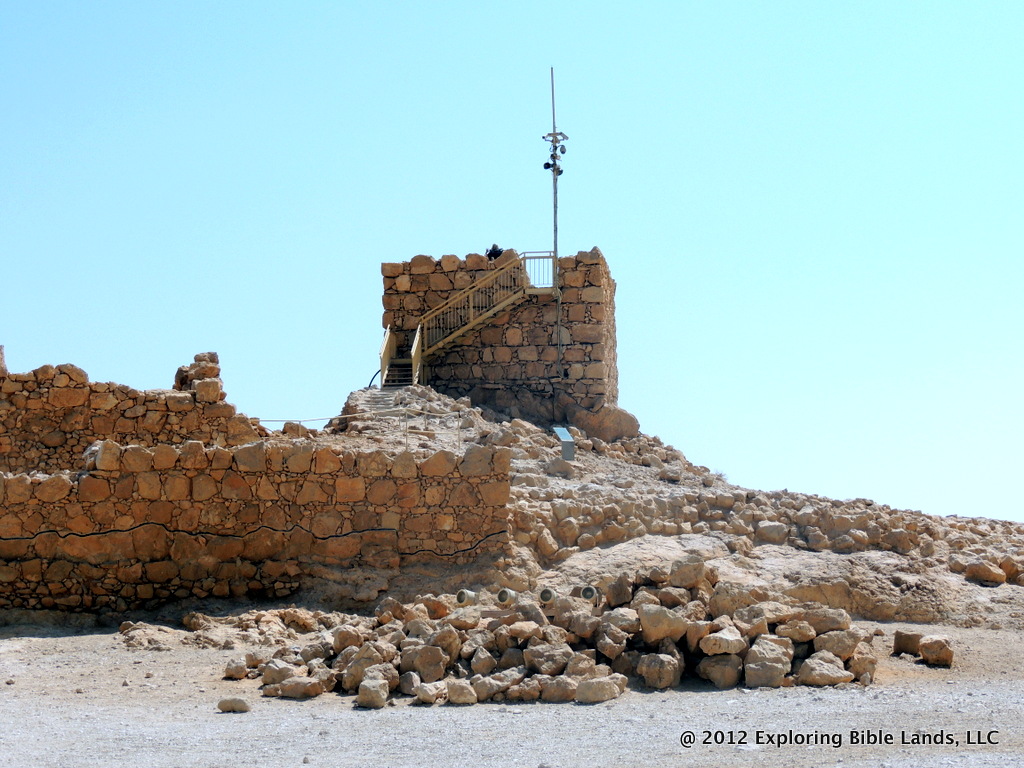 Any visit to the country of Israel must include a stop at Masada. Herod the Great built Masada to be one of his palaces to be used in the winter months. The plateau on which Masada was built is about 1300 feet higher than the surface of the Dead Sea. This made it almost impossible for foreign forces to penetrate its outer walls. After Herod the Great died and the Romans destroyed the city of Jerusalem in 70AD, hundreds of Jewish rebels (along with their families) retreated to Masada. Given the easily defendable nature of Masada, it took the Roman forces over three years before they were able to conquer it. Once they came in, they soon realized that all 960 of the inhabitants (with the exception of two women and five children) had burned the storage houses and committed suicide. They would rather suffer death than to live as Roman slaves.
Before the time of Herod the Great, a fortress on the plateau of Masada would have been easy for anyone to defend. Although the word "masada" is never found in our English Bibles, the word literally means "fortress" or "stronghold". When David was in the area fleeing from Saul, it mentions that he went to a fortress.
Any visit to the country of Israel must include a stop at Masada. Herod the Great built Masada to be one of his palaces to be used in the winter months. The plateau on which Masada was built is about 1300 feet higher than the surface of the Dead Sea. This made it almost impossible for foreign forces to penetrate its outer walls. After Herod the Great died and the Romans destroyed the city of Jerusalem in 70AD, hundreds of Jewish rebels (along with their families) retreated to Masada. Given the easily defendable nature of Masada, it took the Roman forces over three years before they were able to conquer it. Once they came in, they soon realized that all 960 of the inhabitants (with the exception of two women and five children) had burned the storage houses and committed suicide. They would rather suffer death than to live as Roman slaves.
Before the time of Herod the Great, a fortress on the plateau of Masada would have been easy for anyone to defend. Although the word "masada" is never found in our English Bibles, the word literally means "fortress" or "stronghold". When David was in the area fleeing from Saul, it mentions that he went to a fortress.
So David swore to Saul. And Saul went home, but David and his men went up to the stronghold. - 1 Samuel 24:22
Later in David's life, as he reflected on his conflict with Saul, David uses the words "fortress" and "stronghold" in his description of God.
I will love You, O Lord, my strength. The Lord is my rock and my fortress and my deliverer; My God, my strength, in whom I will trust; My shield and the horn of my salvation, my stronghold. I will call upon the Lord, who is worthy to be praised; So shall I be saved from my enemies. - Psalms 18:1-3
Given the safety and protection that Masada provided to its inhabitants, it is no wonder that David used that imagery to describe the feelings that he had for God.
I've recently updated the website to include more information and pictures of Masada.
